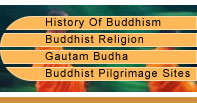Basic Points of Buddhism
Chief monks belonging to both the Theravada sect and the Mahayana sect met in Sri Lanka in the year 1966 and approved the following "Basic Points Unifying the Theravada and Mahayana":
- Buddha is our only Master.
- We take refuge in the Buddha, the Dhamma and the Sangha.
- This world is not created and ruled by a God.
- The purpose of life is to develop empathy for all living beings without prejudice and to work for their good, happiness, and peace. Last but not the least; we need acquire acumen that will lead to the realization of Ultimate Truth.
- We accept the Four Noble Truths of Buddhism
- All accustomed things (samskaara) are transient (anitya) and dukkha and all conditioned and unconditioned things (dharma) are without self (anaatma).
- The Thirty-seven qualities helpful in Enlightenment are different aspects of the path taught by the Buddha.
- There are three ways of attaining Enlightenment, namely as a Disciple, as a Pratyeka-Buddha and as a Samyak-sam-Buddha. The life of a Bodhisattva, who is striving to become a Samyak-sam-Buddha, is the highest, noblest and the most heroic.
- The different Buddhist beliefs, practices, rites and ceremonies, customs and habits followed in different countries should not be confused with the essential teachings of Buddha.
Buddhism does not believe in the existence of a God who created the universe. As per Lord Buddha, one should emphasize on the practical ways of life, which will help a person in attaining enlightenment. However, at the same time, Buddha did not rule out the existence of a God or gods altogether. With the growth and spread of Buddhism, local deities and religious practices were included in it. Today, Tibetan Buddhist cosmology talks about a large number of ‘Divine Beings', believed to be representative of the psychic life. One of the six realms of the Tibetan cosmology is the realm of Gods, who must take birth on earth as humans to attain enlightenment.
Buddhist Deities
Theravada sect of Buddhism does not believe in the existence of deities. However, as per the Mahayana sect, celestial Buddhas and bodhisattvas occupy the universe as Gods and Goddesses. The most popular Buddhist deities include the Laughing Buddha, the Medicine Buddha, Kuan Yin, the Green and White Taras, etc.
Human Nature
As per Buddhism, there is nothing such as a soul or atman. Rather, a human being is believed to be constituted of five elements, namely physical form, feelings, ideations, mental developments and awareness. These components combine to form a human being at the time of birth. However, since Buddhism believes in reincarnation and karma, one finds a little contradiction here.
The Purpose of Living
The main aim of life, as per Buddhism, is the extinction of suffering. By recognizing the four noble truths of life and following the noble eightfold path, one can end the suffering in life.
The Noble Eightfold Path
In Buddhism, it is believed that one can escape from the vicious cycle of birth and death by following the noble eightfold path, consisting of the following eight steps:
- Right Actions
- Right Concentration
- Right Effort/Exercise
- Right Livelihood
- Right Mindfulness/Awareness
- Right Speech
- Right Thoughts
- Right Understanding
The Four Noble Truths, forming the essence of Buddhism, are:
- The Noble Truth of Suffering (Dukkha)
- The Noble Truth of the Origin of Suffering (Samudaya)
- The Noble Truth of the Cessation of Suffering (Nirodha)
- The Noble Truth that leads to the Extinction of Suffering (Magga)




